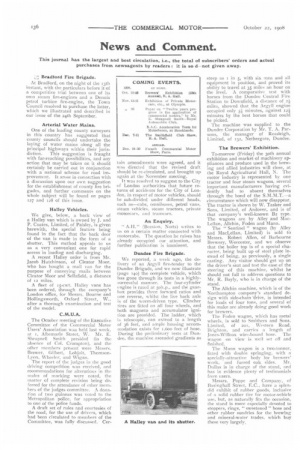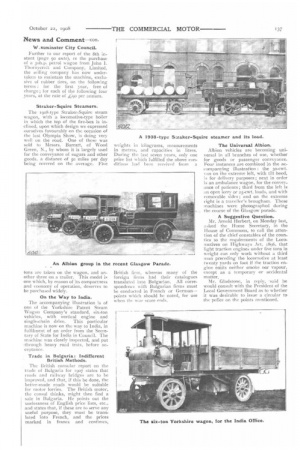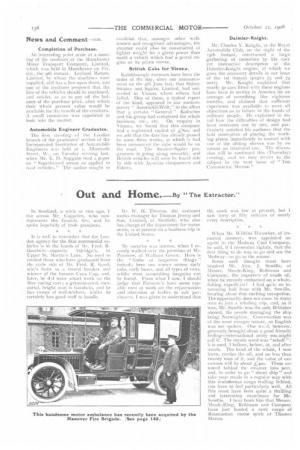News and Comment.
Page 10

Page 11

Page 12

If you've noticed an error in this article please click here to report it so we can fix it.
This journal has the largest and best circulation, i.e., the total of subscribers orders and purchases from newsagents by readers : it is so d not given away.
'c3, Bradford Fire Brigade.
At Bradford, on the night of the 13th instant, with the particulars before it of a competitive trial between one of its OWL) steam fire-engines and a Dennis petrol turbine fire-engine, the Town Council resolved to purchase the latter, which we illustrated and described in our issue of the 24th September.
Arterial Water Mains.
One of the leading county surveyors in this country has suggested that county councils should undertake the laying of water mains along all the principal highways within their juris diction. This suggestion is fraught with far-reaching possibilities, and any action that may he taken on it should certainly be carried out in conjunction with a national scheme for road improvement. It arose in connection with a discussion upon our own suggestion for the establishment of county fire brigades, and further comments on the whole subject will be found on pages 127 and 128 of this issue.
Halley Vehicles.
We give, below, a back view of a Halley van which is owned by J. and P. Coates, Limited, of Paisley, is given herewith, the special feature being found in the fact that the back door of the van is made in the form of a shutter. This method appeals to us as a very convenient one for rapid access in loading and discharging.
A recent Halley order is from Mr. Jacob Hutchinson, of Cleator Moor, who has bought a mail van for the purpose of conveying mails between Creator Moor and Sellafield, a distance of 12 miles.
A fleet of 15-cwt. Halley vans has been ordered, through the company's London office, for Messrs. Bourne and Hollingsworth, Oxford Street, W., after a thorough examination and test of the model.
The October meeting of the Executive Committee of the Commercial Motor Users' Association was held last week, at I, Albemarle Street, W. Mr. E. Shrapnel] Smith presided (in the absence of Col. Crompton), and the other members present were Messrs. Brewer, Gilbert, Lobjoit, ThomsonLynn, Wheeler, and Wigan.
The report of the judges in the good driving competition was received, and recommendations for alterations in the scales of marking were noted, the matter of complete revision being deferred for the attendance of other members of the judges committee. _A donation of two guineas was voted to the Metropolitan police, for appropriation to one of the police funds.
A draft set of rules and courtesies of the road, for the use of drivers, which had been circulated to members of the Committee, was fully discussed. • Cer
tam n amendments were agreed, and it was directed that the revised draft should be re-circulated, and brought up again at the November meeting.
It was resolved to suggest to the City of London authorities that future returns of accidents for the City of London, in respect of motor vehicles, should be sub-divided under different heads, such as—cabs, omnibuses, petrol vans, steam vehicles, steam tractors, private motorcars, and tramcars.
An Enquiry.
" A.H." (Beeston, Notts) writes to us on a certain matter connected with motorcabs. The question he raises has already occupied our attention, and further publication is imminent.
Dundee Fire Brigade.
We reported, a week ago, the delivery of an Argyll fire-tender to the Dundee Brigade, and we now illustrate (page 40) the complete vehicle, which has gone through its tests in a highlysuccessful manner. The four-cylinder engine is rated at 5oh.p., and the gearbox provides three forward ratios and one reverse, whilst the live back axle is of the worm-driven type. Clincher tires are fitted on all four wheels, and both magneto and accumulator ignition are provided. The ladder, which is telescopic, can extend to a length of 36 feet, and ample housing accommodation exists for I,600 feet of hose. During the preliminary tests at Dundee, the machine ascended gradients as
steep as i in 5, with six men and all equipment in position, and proved its ability to travel at 35 miles an hour on the level. A comparative test with horses from the Dundee Central Fire Station to Downfield, a distance of 2i miles, showed that the Argyll engine
occupied only minutes, against 12t minutes by the best horses that could be picked.
The machine was supplied to the Dundee Corporation by Mr. T. A. Parsons, the manager of Rossleigh, Limited, of 132, Nethergate, Dundee.
The Brewers' Exhibition.
To-morrow (Friday) the 3oth annual exhibition and market of machinery appliances and produce used in the brewing and allied industries will close, at the Royal Agricultural Hall, N. The motor industry is represented by one tractor and four steam wagons, several itnportant manufacturers having evidently had to absent themselves through the bond of the S.M.M.T.—a circumstance which will now disappear. The tractor is shown by W. Tasker and Sons, Limited, of Andover, and is of that company's well-known B2 type. The wagons are by Alley and MacLellan, Allchin, Foden and Mann.
The " Sentinel " wagon (by Alley and MacLellan, Limited) is sold to Messrs. Robert Allen, of Barbourne Brewery, Worcester, and we observe that the boiler top is of a special character, being built up of steel plate instead of being, as previously, a single casting. Any visitor should get up on the driver's seat and test the ease of the steering of this machine, whilst he should not fail to address questions to Mr. R. Bayly, who is in charge of the stand.
The Allchin machine, which is of the Northampton company's standard design with side-chain 'drive, is intended for loads of four tons, and several of this make are already doing good work for brewers.
The Foden wagon, which has metal wheels, is sold to Smithers and Sons, Limited, of 201, Western Road, Brighton, and carries a length of Jones-Willcox wire-bound hose. The wagon on view is well set off and finished.
The Mann wagon is a two-tonner, fitted with double springing, with a specially-attractive body for brewers' work, and fumed oak sides. Mr. Dallas is in charge of the stand, and has in evidence plenty of testimonials from users.
Messrs. Poppe and Company, of Basinghall Street, B.C., have a splendid exhibit of rubber goods, inclusive of a solid rubber tire for motor-vehicle use, but, as naturally fits the occasion, the stand is more especially devoted to stoppers, rings, "sweetened " hose and other rubber sundries for the brewing and mineral-water trades, which buy these very largely. W.Lstminster City Council.
Further to our report of the 8th instant (page 90 ante), re the purchase of a Juh.p. petrol wagon from John I. Thornycroft and Company, Limited, the selling company has now undertaken to maintain the machine, exclusive of rubber tires, on the following terms : for the first year, free of charge; for each of the following four years, at the rate of 443 per annum.
Straker-Squire Steamers.
The o9o8-type Straker-Squire steam wagon, with a locomotive-type boiler in which the top of the lire-box is inclined, upon which design we expressed ourselves favourably on the occasion of the last Olympia Show, is doing very well on the road. One of these was sold to MeSsrs. Barratt, of Wood Green, N., by whom it is largely used for the conveyance of sugars and other goods, a distance of jo miles per day being covered on the average. Five
tons are taken on the wagon, and another three on a trailer. This model is one which, by reason of its compactness and economy of operation, deserves to be purchased widely.
On the Way to India.
The accompanying illustration is of one of the Yorkshire Patent Steam Wagon Company's standard, six-ton vehicles, with vertical engine and single-chain drive. This particular machine is now on the way to India, in fulfilment of an order from the Secretary of State for India in Council. The machine was closely inspected, and put :through heavy road tests, before acceptance.
Trade in Bulgaria: Indifferent • British Methods,
The British consular report on the trade of Bulgaria for 1907 states that roads and railway bridges are to be improved, and that, if this be done, the better-made roads would be suitable for motor lorries. The British motor, the consul thinks, might then find a sale in Bulgaria. He points out the uselessness of English price lists, etc., and states that, if these are to serve any useful purpose, they must be. translated into French, and the prices marked in francs and centimes, weights in Hog-rams, measurements in metres, and capacities in litres. During the last seven years, only one price list which fulfilled the above conditions had been received from a
British firm, whereas many of the foreign firms had their catalogues translated into Bulgarian. All correspondence with Bulgarian firms must be conducted in French or German— points which should be noted, for use when the war scare ends. The Universal Albion.
Albion vehicles are becoming universal in all branches of use, whether for goods or passenger conveyance. Four instances are combined in the accompanying illustration : the 3o-cwt. van on the extreme left, with tilt hood, is for delivery purposes; next in order is an ambulance wagon, for the conveyance of patients ; third from the left is in Open forty or 25-cwt, loads, and with removable sides ; and on the extreme right is a traveller's brougham. These machines were photographed during the course of the Glasgow parade.
A Suggestive Question.
Mr. Arnold Herbert, on Monday last, asked.the Home Secretary, in the lIouse of Commons, to call the attention of the chief constables of the counties to the requirements of the Locomotives on Highways Act, 1896, that light traction engines under five tons in weight can only work without a third man preceding the locomotive at least twenty yards on foot if the traction engine emits neither smoke nor vapour, except as a temporary or accidental matter,
Mr. Gladstone, in reply, said he would consult with the President of the Local Government Board as to whether it was desirable to issue a circular to the police on the points mentioned. Completion of Purchase.
.1n interesting point arose at a meeting of the creditors of the Manchester Motor Transport Company, Limited, which was held in Manchester on Friday, the yth instant. Leyland Motors, Limited, by whom the machines were supplied, still has a lien upon them, and one of the creditors proposed that the hire of the vehicles should be continued, and sub-let, so as to pay off the balance of the purchase price, after which their whole present value would be available for the benefit of the creditors. A small comnthdee was appointed to look into the matter.
Automobile Engineer Graduates.
The first mioting of the London branch of the graduates' seetioe of the Incorporated Institution of Autcmobile Engineers was held at 1, ,Albemarle Street, NV., on Tuesday evening last, when Mr. E. 1). Sag-gate read a paper on " Superheated steam as applied to road vehicles." The author sought to
establish that, amongst other wellknown and recognised advantages, the steamer could also be constructed of lighter weight for a given power than could a vehicle which had a petrol engine as its prime mover.
British Cabs tor Vienna.
Kaleidoscopic rumours have been the order of the day, since our announcement on the 4th June last, that Sidney Straker and Squire, Limited, had succeeded in Vienna where others had failed. One of these, a typical report of the kind, appeared in our contemporary " Autornobil-Welt," to the effect that a certain " General " Kolischer and his group had completed the whole
business, etc., etc. On enquiry in Vienna, we found that this company had a registered capital of -4:8(x), and we add that the date has already passed by some three weeks, at which it had been announced the cabs would be on the road. The Straker-Squire programme is going along smoothly, and British vehicles will soon be found side by side with Austrian einspanners and fiakers. Mr. Charles Y. Knight, at the Royal Automobile Club, on the night of the 15th instant, entertained a large gathering of motorists by his racy yet instructive description of the I/aim-der-Knight engine, of which we gave the necessary details in our issue of the 1st instant (pages 73 and 74 ante). Mr. Knight explained that nearly 5o cars fitted with these engines have been in service in America for an average of something like eighteen months, and claimed that sufficient experience was available to meet all objections as to failure in the hands of ordinary people. He explained in detail how the difficulties of design had been overcome one by one, and particularly satisfied his audience that the bold conception of placing the working piston immediately in contact with one of the sliding sleeves was by no means an irrational one. The discussion will be continued this (Thursday) evening, and we may return to the subject in the next issue of " THE COMMERCIAL MOTOR."




















